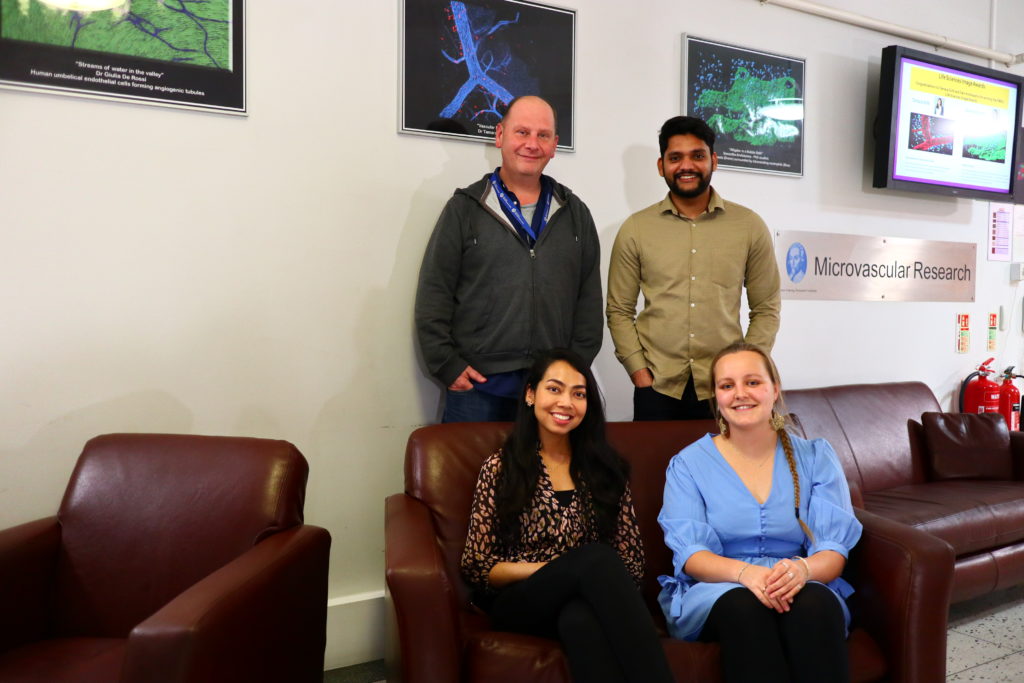
Published December 2022
Summary
Dr James Whiteford and his team at Queen Mary University of London are investigating how to activate a molecular ‘off switch’ that could slow or even reverse age-related diseases such as macular degeneration and lung fibrosis.
It’s really important that we push forward with translating our discoveries into new treatments that will make a difference to people’s lives.
Dr James Whiteford
Wet age-related macular degeneration, or wet AMD, is an eye condition caused by abnormal blood vessels growing in the back of the eyeball. It leads to gradual loss of vision and is one of the leading causes of blindness in older people. Current treatments for wet AMD work by blocking blood vessel growth, but they are very expensive and don’t work for around half of all patients. And when they do work, they lose their effectiveness over time.
Our research focuses on understanding the fundamental biological processes that control responses to injury, such as blood vessel growth and scar formation. So when we discovered that a molecule known as CD148 seemed to be playing an important role in switching off these responses once a wound has healed, we wondered whether we could use this knowledge to develop more effective treatments for diseases like wet AMD where healing processes are running abnormally.
From a bright idea to a potential drug
CD148 is a receptor protein that sits on the surface of cells and acts like a switch, turning certain activities on or off. When CD148 is ‘off’, cells are able to help grow new blood vessels and heal wounds, but when it is ‘on’, these processes come to a halt.
A few years ago, we discovered that a small chemical known as a peptide can lock on to CD148, turning it ‘on’ and shutting down wound healing. We applied to the Dunhill Medical Trust for funding to study this peptide in depth, in order to develop it into a drug to treat wet AMD and other conditions involving aberrant wound healing processes.
Funding from the Dunhill Medical Trust has been vital for helping us take this project forward and we’re incredibly grateful for their support.
We’re using cutting edge techniques to understand the precise molecular structure of CD148 and how it binds to the peptide, to see if we can make tweaks that will make it more effective. Surprisingly, we found that there are three different places in CD148 that the peptide can bind, so now we’re trying to work out what these binding sites are doing and whether they are all equally important.
We’ve also been doing detailed experiments in the lab to understand exactly how CD148 works and how it sends signals to cells to tell them to stop wound healing processes. And we’ve got promising results from our preclinical tests of the peptide, showing that it can effectively treat mice with wet AMD.

From eyes to lungs
We’ve been able to extend our work further thanks to a collaboration with a team at Baylor College of Medicine in Texas who are working on idiopathic pulmonary fibrosis (IPF) – a disease causing severe scarring in the lungs that mainly affects older people. The treatments we currently have for IPF can only slow down its progress and there is no way of reversing it, so new therapies are urgently needed.
The Baylor team have discovered that CD148 is also involved in IPF, probably by failing to switch off abnormal scar formation processes in the lungs, and are now testing whether drugs based on our peptide can help to slow or stop the disease. This could potentially be very important in the light of the pandemic, as COVID-19 can cause long-term lung scarring in some people and could lead to many cases of IPF in the future.
Looking to the future
CD148 is a newly-discovered molecule that nobody knows a lot about, so it’s hugely exciting to be finding out new things about how it works and how we can control it, not just in disease but also in normal health too. But while the science we’re doing in the lab is fascinating, it’s really important that we push forward with translating our discoveries into new treatments that will make a difference to people’s lives.
We’re currently in negotiations with a pharmaceutical company to take forward our peptide drug into clinical trials for wet AMD, and we are setting up a spin-out company to develop new treatments for IPF based on our findings. There are still a lot of hurdles to be overcome, but it’s exciting to see the progress we’re making.
Funding from the Dunhill Medical Trust has been vital for helping us take this project forward and we’re incredibly grateful for their support. By taking a wide-ranging view of ageing research and supporting this kind of translational science, they’ve enabled us to bring a bright idea in the lab much closer to being a treatment for age-related diseases.

